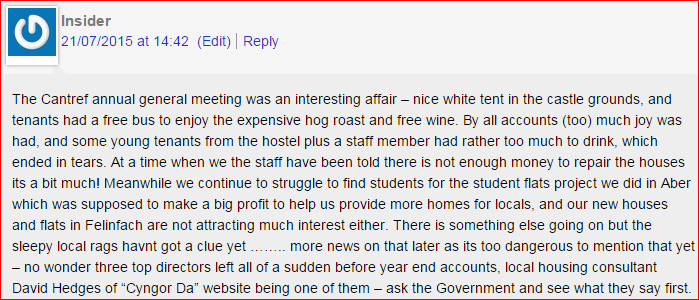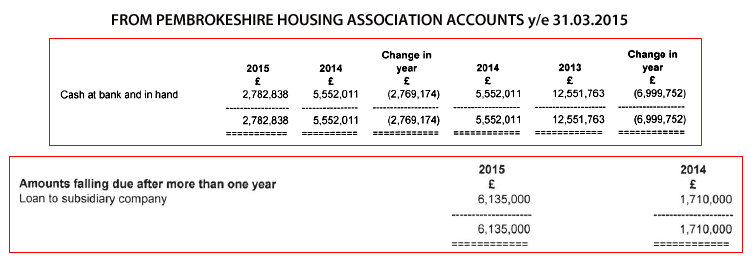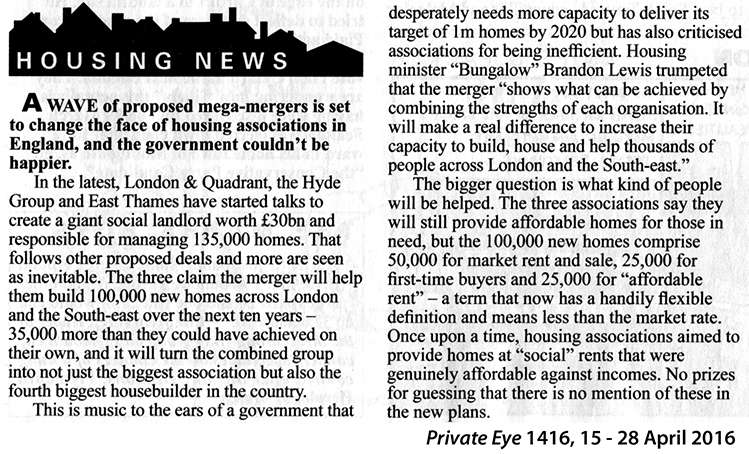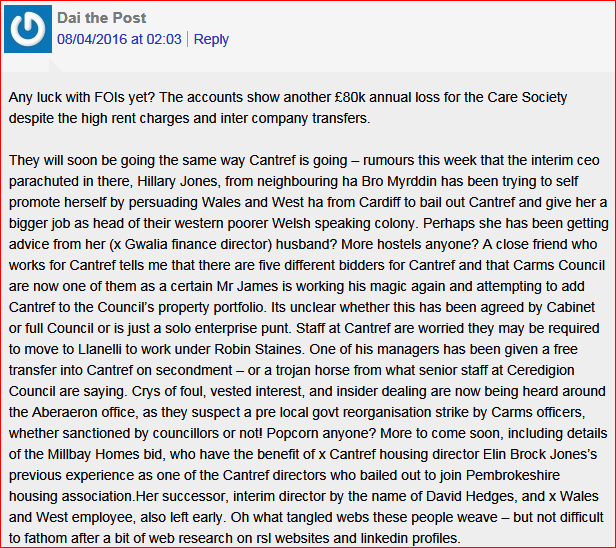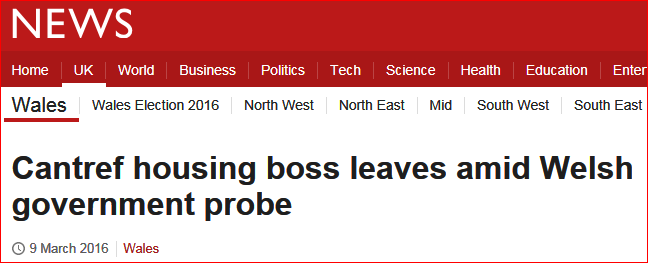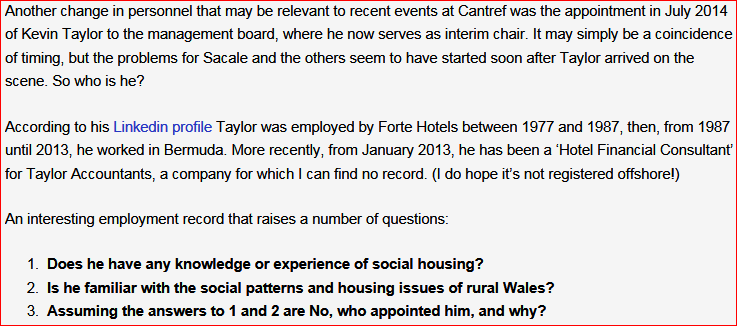TO RECAP . . .
I have written many times about social housing in Wales, and of the many problems created by the more irresponsible housing associations. Here are just a few of the problems:
- Unlike in Scotland, social housing providers in Wales are tied into an Englandandwales system. This results in our housing associations having to give priority treatment to people with no Welsh connections.
- Many of those being housed by these routes will be ‘problem families’, or young tearaways, they might be drug and alcohol abusers, or they’ll be recently released from prison. These issues will inevitably place a burden on our health service and other facilities while also affecting the quality of life in many Welsh communities.
- Wales has an ageing population. In a decade or so Wales will be the ‘oldest’ country in western Europe. This also places a strain on our NHS and other services which results in money being taken from education and other budgets. Yet many housing associations, particularly in the north, are using public funding to build housing for the elderly and the infirm brought in from outside of Wales.
- Despite the recommendations of the Notional Assembly’s Public Accounts Committee social housing providers are still diversifying through unaccountable subsidiaries. This results, for example, in the insane situation in Pembrokeshire where The Pembrokeshire Housing Association is passing public money to its subsidiary, Mill Bay Homes for MBH to build houses for sale on the open market!
- Many Welsh housing associations lease or rent properties from companies based in tax havens. I explored this connection in Link Holdings (Gibraltar) Ltd. Yet no one in the ‘Welsh’ Government seems to care that Welsh social housing tenants could be living in properties owned by the Mafia, or ISIS.
- Housing associations form secretive and costly links with Third Sector and other bodies. Some of these links are of questionable legality, of dubious benefit to Wales, but always costly to the Welsh public purse.
- And that, perhaps, is the biggest worry of all. That no one with responsibility for overseeing social housing bodies, no one who funds them with hundreds of millions of pounds of public money, seems to care how they operate. It’s left to self-evaluation and self-appraisal – box-ticking exercises which of course never find any problems. So everybody’s happy!
◊
NEWS FROM THE NORTH
A taste for what follows may be obtained from the post Bits & Pieces of September 30th. Now here’s the latest:
Paul Diggory, the Chester-based former boss of ailing North Wales Housing, is now promoting himself – something he’s very good at – as a ‘housing and social enterprise freelance‘, which fits in nicely with his role as chair of the Chartered Institute of Housing in Wales.
Diggory gives us one of the two qualifications needed to run a Welsh housing association: either be English like him and the CEOs recently appointed to Valleys to Coast, Bron Afon and Hendre; or else have good links with the Labour Party, which accounts for the appointments of both Trivallis’ new £150,000 a year CEO and the new Board chair, Tracy Myhills, previously CEO at the Welsh Ambulance Trust. (How’d you like that on your CV!)
It should go without saying that if you’re English and a member or supporter of the Labour Party then you get to take your pick of which housing association you’d like to run. Being English but supporting some other party would be acceptable, but if you’re non-Labour Welsh, forget it.
This is how a one-party state operates.
Staying in the north for a minute . . . Not so long ago Labour’s most favoured housing association, Wales & West, built a big new office building in Ewloe, Flintshire, very close to the border.

Many thought at the time that a Cardiff-based housing association might be over-extending itself with this office block, but no, for since then W&W has not only swallowed up Cantref of Castell Newydd Emlyn, and branched out into Ceredigion, but is also hovering, vulture-like, over ailing HAs across the land.
One housing association viewed as sickly and about to fall is Pennaf. The Pennaf Group is based in Llanelwy (St Asaph) and includes the Clwyd Alyn housing association and Offa, a lettings and management service. A northern source tells me that a couple of factors may be contributing to make Pennaf look a tasty dish.
First, CEO Graham Worthington – also based in Chester! – has just announced his retirement; plus, it seems that Pennaf has been tardy in bringing its 4,500 properties up to Welsh Housing Quality Standard, something it should have done by 2012.
The reason for Pennaf finding itself in this parlous position is I’m told due to spending too much time and money building care and residential homes – i.e. using Welsh public funding to bring in more retirees, so as to put extra strain on the NHS and social services that will result in education and other budgets being raided.
Only in Wales!
◊
WALES & WEST WAY OUT WEST AND WAY OUT OF LINE
I’ve just mentioned that Wales & West snaffled up Cantref of Castell Newydd Emlyn, which operated mainly in Ceredigion, but W&W is also branching out in other ways.
When the ‘Welsh’ Labour Government handed Cantref over to Wales and West part of the dowry was valuable land at Plas Morolwg in Aberystwyth, overlooking the marina and with nice views out to sea. That site is now earmarked for 60 extra care flats. It’s doubtful if Ceredigion needs this development, certainly, it’s suggested that if it goes ahead it will jeopardise Mid Wales Housing’s Cylch Caron project in Tregaron.
But things are never that simple in Ceredigion.
Ceredigion council’s leader, Ellen ap Gwynn of Plaid Cymru, is under intense pressure over the closure of the Bodlondeb care home in Aberystwyth. Motivated by nothing more than a deep and heartfelt concern for the old biddies therein Labour and Lib Dems have taken to protesting against the closure, even recruiting that one-boy rent-a-mob and self-promoting little shite, Owen Jones.
It is further suggested that certain council officials such as strategy officers and planners who – how can I put this? – whose first spoonful might not have been puréed laverbread, are bending over backwards to help an anti-Welsh organisation like Wales & West.
An unholy alliance of Plaid Cymru and Welsh-haters.
Let’s now turn our attention to Lampeter, where Wales and West is very active, and plans yet more expansion. What follows is information for which I offer thanks to someone obviously well-informed about council business.
To begin with, there are widespread concerns in Lampeter that Wales & West is failing to evict its drug-dealing tenants in Bryn Road and North Road. But things are almost certainly going to get worse, for W&W is said to be in the process of buying the old Ffynnonbedr school building in order to build yet more flats in an area of low need. So Lampeter can expect more drug addicts to arrive. Lucky Lampeter!
UPDATE 08.11.2017: A pre-planning consultation notice appeared on the door of the old Ffynnonbedr school today. The architect Geraint John of Cardiff is making the planning statement/application in the name of Hacer Developments of Swansea.
This document – at 5.5 and 5.6 – makes great play of an agreement between Ceredigion council and Cantref in the early part of 2016 and seems to suggest that Cantref is the client. But of course Cantref was taken over by Wales & West over a year ago, but I can find no mention of Wales & West. Understandable given the drug dealers and others W&W has already brought into the town.
As if that wasn’t worrying enough for the good people of Lambed, I hear from a former weekend soldier that the old Territorial Army building – also on Bryn Road – is up for sale, and word is that W&W want to buy this as well. But I bet you’d guessed that already!
I’ve mentioned that Wales & West refuses to evict its lucrative drug-dealing tenants in Lampeter, and for this it has been congratulated by fellow Labour Party members in Shelter Cymru. Mutual back-scratching among Labour-run Third Sector bodies is so prevalent and blatant that they even try to make a virtue of it.

Elsewhere the tale of evictions is different. For back in Aberystwyth, mainly local 16- and 17-year-olds are being evicted from Wales & West’s Tŷ Curig hostel . . . to make way for new ‘guests’. Most of these replacements will arrive burdened with ‘issues’, but it is these very ‘issues’ that will allow W&W to charge a hefty fee for housing them – leaving the rest of us to pick up the bill.
Before leaving Wales & West for a moment I should also point out that the new office building wasn’t restricted to Ewloe, for there’s also the new HQ in Cardiff. This too may be in anticipation of expansion, with one of the potential victims rumoured to be Cardiff Community Housing Association, where CEO Kevin Protheroe is about to retire.
◊
WHY DO I SAY ‘ANTI-WELSH’?
I try to be careful in using the right word, and that’s why I have no hesitation in describing Wales & West Housing – and others I’ll soon mention – as anti-Welsh.
Non-Welsh or un-Welsh might imply someone or something having nothing to do with Wales; it might suggest ignorance of Wales’ distinctiveness, possibly ambivalence; but by using anti-Welsh I mean awareness of the Welsh language, and other things that make Wales different, but deliberately seeking to denigrate and undermine them. This certainly applies to Wales & West, which is why I describe W&W as anti-Welsh.
Let’s start with the W&W website – it’s in English only. As is the website of another Labour-run housing association I’ve mentioned, Trivallis (formerly RCT Homes). This is no accident, for when it comes to the Welsh language most Labour Party members and supporters agree with Neil Kinnock rather than with Carwyn Jones.
Other HAs – Bro Myrddin, for example – rely on Google Translate. The CEO at Bro Myrddin is Hilary Jones, said to be an ‘ally’ of W&W, who is rumoured to be taking an interest in Hafan Cymru, reported to be in serious trouble due to its over-reliance on the Supporting People programme and EU funding.
But the point is that all Registered Social Landlords are legally required to give equal status to both languages, and also to have a Welsh language scheme in place. But the Regulation Managers employed to enforce these requirements obviously aren’t up to the job (or maybe they too missed out on the puréed laverbread).
Or does the fault lie with those above them? I ask because this recent advertisement for a Regulation Manager bizarrely and confusingly talks of “capability to work in both English and Welsh” but then says that Welsh is “not necessary“!

This seems to be a case of going through the motions: ‘Look, we’ve got to say this about the Welsh language . . . but in practice it doesn’t really mean anything‘.
A concrete example of Wales and West’s contempt for the Welsh language came recently with its advertisement for a Development Officer in Newcastle Emlyn, with the advertisement in English only and no requirement to speak Welsh in an area where Welsh is widely spoken. Welsh is certainly the majority language among the native Welsh.
This advertisement is not an oversight, nor is the absence of a Welsh website. This is flaunting power. This is a bunch of Labour bigots, with the ‘Welsh’ Government behind them saying, ‘Fuck you, and your language!‘
How will this attitude contribute to Carwyn Jones’ one million Welsh speakers by 2050?
◊
IMAGE CONFLICTING WITH REALITY
We are encouraged to think of housing associations as streamlined, twenty-first century replacements for the old local authority housing departments, but doing a much better job. In fact, they have so little in common that any comparison is invalid.
To begin with, councils operate within defined geographical areas, whereas housing associations are spread all over the country competing with each other and duplicating each other’s work. Competition and duplication that places a wholly unnecessary burden on the public purse.
This has obviously been realised, and the problem is being addressed by encouraging those housing associations that are most ‘reliable’ from a Labour Party perspective – which also happen to be the least Welsh in staff and attitudes – to expand and take over the others. Which has two main results.
One, it increases Labour Party influence in areas of Wales where the party has no MPs or AMs. Two, it encourages instinctively anti-Welsh organisations to expand into areas where the Welsh language is strong. Good for the Labour Party but a disaster for the Welsh language and for Wales
Another difference is that local authority housing departments would never have struck deals with outside agencies to import someone else’s criminals, paedophiles, drug addicts, problem families, etc. The reason being that councils had that link with their patch, that commitment to their people, and of course councillors needed to be re-elected. With housing associations such considerations and restraints are absent.
For housing associations are distant bodies, answerable to nobody, and can do what they damn well like. And because there’s little profit to be made from housing decent, law-abiding locals, but lots of money available if they inflict problems on small Welsh towns like Lampeter, that’s the model they follow.

And while there are healthy profits for Wales & West and others from importing undesirables, once here they place an inevitable burden on local health and other services, and police resources, while causing misery and disruption to Welsh communities. In a different category, but having a similar effect on the Welsh public purse, are the retirees being brought into Wales, and this is no longer confined to the Costa Geriatrica.
All of which results in the Welsh public purse, which funds W&W and the rest of them, losing out again, and again, and again. And we are the public purse, you and I. It is we who lose out in having to endure inferior facilities and strained resources.
But the model followed by Wales & West is profitable. And the profits made, coupled with ‘Welsh’ Labour backing, allow W&W to undermine and then swallow up their smaller and weaker brethren, which will include responsible social housing providers sticking to what should be the role of housing associations – providing rented housing for local people.
And some day in the not-too-distant future, when towns like Lampeter and Aberystwyth are awash with drug addicts and criminals from God knows where, and there are only a few housing associations left standing, the ‘Welsh’ Labour Party will control them all.
Allowing ‘Welsh’ Labour, through its housing associations and other Third Sector bodies, to exert a control over Wales denied it by the ballot box. We shall have arrived at the one-party state.
Endgame.
♦ end ♦






















